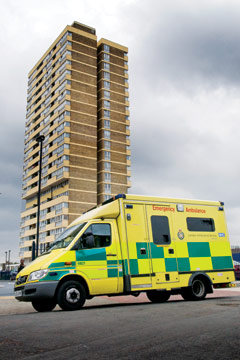A document outlining how London’s acute and complex cardiovascular services are currently provided and broad principles for how things could be improved, Cardiovascular services in London: the case for change, has now been published.
 This document has been produced by Commissioning Support for London, an organisation established by the capital’s 31 primary care trusts (PCTs), in response to Lord Darzi’s 2007 report which found that while there is excellence in healthcare in London, this excellence is not provided equally across the capital.
This document has been produced by Commissioning Support for London, an organisation established by the capital’s 31 primary care trusts (PCTs), in response to Lord Darzi’s 2007 report which found that while there is excellence in healthcare in London, this excellence is not provided equally across the capital.
The cardiovascular project has been split into three areas of work each with key objectives:
- Vascular services – specialist and emergency vascular services
- Cardiac surgery – all cardiac surgery, except paediatrics and transplants
- Cardiology – emergency and complex interventional cardiology procedures.
The project is clinically-led and each area of work has a nominated clinical lead supported by a clinical expert panel, and has also been advised by a patient panel.
The Case for change document says the initiative addresses longer than necessary waiting times for surgery, lengths of stays in hospital, and quality of care.
Specific issues mentioned that need to be addressed include:
Abdominal aortic aneurysm repair: new figures showing that UK patients have significantly worse mortality rates following abdominal aortic aneurysm repair than other leading European countries. They are also less likely to be treated using new technology and have the longest hospital stays.
Delays for non-elective cardiac surgery: the best healthcare systems in the world have a total pathway for non-elective cardiac surgery (from decision to operation to leaving hospital after surgery) of around two weeks. In London this can take up to almost three times as long (52 days). This delay puts patients at risk from suffering a venous thrombo-embolism, having a cardiac event or acquiring a hospital infection. To begin improving the situation in London, a total pathway length of no more than three weeks is recommended.
Reducing the length of stay: there is a dramatic variation in the length of stay in hospital following cardiac and vascular surgery, depending on which hospital undertakes the surgery. Standardised processes are needed to ensure patients return home when they are clinically ready. If every unit matched the best length of stay, there would be huge benefits for patients, as well as cost savings and efficiency gains.
Aortic dissection: although the number of patients suffering life-threatening aortic dissection in London every year is small, they suffer high mortality rates with many people never even reaching a hospital. To save more lives, patients need prompt treatment by a specialist surgeon and the London cardiac community needs to come together to provide an out-of-hours emergency service.
Transfer and referral between hospitals: in some parts of London, the total pathway length for patients undergoing non-elective percutaneous coronary intervention (PCI) is more than 10 days. Considering that most patients recover within a couple of days of the procedure, this is far too long.
ICD and CRT devices: compared with the rest of Europe, the UK implants fewer implantable cardioverter deribrillators (ICDs), cardiac resynchronisation therapy (CRT) devices, and pacemakers and performs fewer ablations, leading to considerable unmet demand in the population. More patients need to be identified for these procedures through improved training and networking, and they must be treated in experienced units that demonstrate the highest quality care.
New technology: greater planning for the introduction of new technology with a clearly communicated plan for roll out is needed, initially concentrating expertise in a small number of sites.
Improving academia: the level of research output in London needs to be improved, and the high level of cardiac surgery performed in London, with a wide variety of cases and research laboratories available, offers an ideal opportunity for research.
New roles: training for cardiac surgeons must evolve and there is scope to develop new roles, such as surgical care practitioners.
The Case for change document can be viewed in detail at the Healthcare for London website: www.healthcareforlondon.nhs.uk.
